Photographs: B Mathur/Reuters Krishnakumar Padmanabhan
The United Progressive Alliance government has called for an all-party meeting on Wednesday to discuss the volatile situation in the Kashmir valley, which further deteriorated this week, with 18 civilians being killed on a single day, September 13.
Since June 11, 91 people, mostly youngsters, have been killed in clashes between protestors and security forces.
Prime Minister Manmohan Singh, following an all-party meeting on Kashmir last month, had made a direct appeal to the youth of Kashmir, asking them to shun violence, saying that he understood their pain and anguish.
But with that and earlier all-party meetings failing to result in a consensus on how to proceed in the valley, the Cabinet Committee on Security met on Monday to discuss the status of the controversial Armed Forces Special Powers Act.
The CCS is likely to meet again on Wednesday after the all-party meeting. The all-party meet is scheduled for 11:30 am. The CCS met for three hours on Monday to review the volatile situation and expressed distress over the turn of events since Eid. A statement issued after the CCS meeting expressed readiness for talks to address the trust deficit and 'governance deficit'.
The CCS meeting had set off speculation that the government could consider a partial withdrawal of AFSPA as mooted by Jammu and Kashmir Chief Minister Omar Abdullah.
Wednesday's meeting is just the latest of many such all-party sessions that the prime minister has chaired during his government's second stint in power.
Some observers feel there are two main aspects that distinguish Dr Singh's approach.
"First, he has not tackled any major national issue. Apart from price rise, which is a perennial issue that dogged even prime ministers I K Gujaral and Atal Bihari Vajpayee, most issues Dr Singh has addressed are regional. And he has discussed these issues with the regional parties and sorted them out," says a senior New Delhi-based journalist who has been covering Parliament and the central government for decades.
"Second, the prime minister has departed from tradition and has been talking to political parties individually. Like with the nuclear liability bill, which would have normally deserved to be resolved with an all-party meeting, he met with party leaders from across the spectrum individually and addressed their concerns," the journalist added.
One reason for this, political observers say, could be because all-party meetings traditionally tend to result in a stalemate and precious time is lost, with not much to show for in the end.
Please Click the Next button to look at some recent issues that have merited the coming together of political parties, and the results of these all-party meetings.
Kashmir issue: Ongoing discussions
Image: Kashmiri protesters throw stones at the police in SrinagarPhotographs: Danish Ismail/Reuters
But that meeting did not result in much progress with the principal Opposition party, the People's Democratic Party, staying away from the discussion, refusing to heed even the prime minister's request to attend.
The prime minister then met with leaders of all parties from Jammu and Kashmir in New Delhi on August 10. This was followed by a televised direct address to the youth of Kashmir, asking them to give up violence.
Though Dr Singh's speech was appreciated in some New Delhi quarters, with observers saying it was late but still crucial, there was not much impact in the valley.
Though there was a lull in the violence during Ramazan, violence escalated during Eid on Saturday, September 11.
Telangana issue: Stalemate
Image: Pro-Telangana supporters shout slogans after being detained by police during a protest in HyderabadPhotographs: Krishnendu Halder/Reuters
Home Minister P Chidambaram, whose midnight statement announcing the government's intent of creating a Telangana state a month earlier, invited eight parties to the discussions.
The decision came after detailed deliberations in the government and at the highest level in the Congress. The parties were divided and even public representatives belonging to these parties were split on regional lines.
Violent protests broke out in the Andhra region soon after Chidambaram's announcement about the creation of a Telangana state. Several MPs and legislators 'resigned', to force the government's hand.
The all-party meeting did not expectedly lead to a consensus and the issue was put on the backburner after the formation of an expert committee, headed by the former Supreme Court judge Justice B N Srikrishna to look into the matter.
The Srikrishna committee will submit its findings on Telangana by December 31.
Also Read: 'We don't know who represents Telangana'
Price rise: Resolved temporarily
Image: A woman at a grocery store in MumbaiPhotographs: Arko Dutta/Reuters
The Bharatiya Janata Party, the Left and many other parties came together to disrupt Parliament during the monsoon season in August.
The government did what it does in such situations of acute distress -- turn to Finance Minister and troubleshooter-in-chief Pranab Mukherjee.
Mukherjee convened a breakfast meeting of all-party leaders to end the stalemate in Parliament. Voila, Parliament functioned smoothly from that meeting onwards.
The Opposition gave up its demand for a motion to discuss the price rise issue under rules that entail voting and agreed for passing a resolution after discussion in both Houses.
The Opposition parties blamed Dr Manmohan Singh's government for its failure to control the huge rise in prices, particularly of food items and petroleum products.
General inflation has remained in the double digits while the prices of food items are increasing by 9.6 per cent.
With frequent public protests, the Opposition parties seem content to keep the issue simmering, to be used when an opportunity presents itself.
In terms of crisis management, Mukherjee's chat is one of the few occasions in UPA-2 where an all-party meeting led to some resolution.
Also Read: Golden tips to beat inflation
Women's bill: Inconclusive
Image: Women activists during a protest outside Parliament demanding the introduction of the women's reservation billPhotographs: Reuters
For years now, Lalu Prasad Yadav of the Rashtriya Janata Dal and Mulayam Singh Yadav of the Samajwadi Party have been the main political forces opposed to the bill.
Lalu said the bill 'would deny adequate representation to other sections of society.' He favoured 10 to 15 percent reservation for women.
Mulayam favoured making it mandatory for political parties to give 10 percent of election tickets to women. He said if 33.3 per cent was reserved for women, then with the existing 22.5 percent for scheduled castes and tribes, more than 55 percent of seats in Parliament would be reserved. This would not be fair to other sections of the population, he added.
Several all-party meetings on the issue ended in a stalemate during UPA-1's five years in power, but the bill fell off the radar after the nuclear bill took the lead role in the government's agenda.
Tensions soared after the government evicted Opposition members in the Rajya Sabha and passed the bill in March. This did not go down well, and the government could not enforce an encore in the Lok Sabha.
Again, enter the man for such moments: Pranabda.
With UPA Chairperson Sonia Gandhi's strong support, Mukherjee led backchannel negotiations with the parties and ensured the passage of the bill in the Lok Sabha.
Again, an instance where the all-party exercise complicated the problem, only for some backroom negotiations saving the day.
Also Read: The ring-a-ring-a-roses of the Women's Bill
Nuclear liability bill: Success
Image: Dr Singh with US President Barack Obama at the Nuclear Security Summit in Washington, DCPhotographs: Kevin Lamarque/Reuters
Dr Manmohan Singh, instead of calling for an all-party meeting that could complicate matters, tackled the parties on a one-on-one basis. Some may disagree with the method, but no one can deny that it bore fruit.
Ending months of wrangling between the Treasury benches and the Opposition, the Lok Sabha on August 25, passed the civil nuclear liability bill after the government dropped the contentious provision of 'intent' in the case of accident (an amendment suggested by the Bharatiya Janata Party) paving the way for nuclear commerce with the world. The BJP in turn had assured that it would not disrupt proceedings and passage.
Another amendment, suggested by the Communist Party of India, was negated thanks to the support garnered from the BJP as the House voted 252-52.
Everything was out in the open for everyone to see, as the language of the official amendment matched the amendment moved by BJP leader Jaswant Singh.
Here too, Finance Minister Pranab Mukherjee led the negotiations to break the deadlock with the Opposition, which had contended that it was impossible to prove intent on the part of suppliers or their employees in case of an accident.
Thus on balance, though the all-party meeting seems to be the correct thing to do on paper, successive leaders and governments have evolved their own way of breaking deadlocks and resolving differences.
The all-party meeting also suffers from the fact that it often brings to the same table bitter rivals who don't see eye to eye on most issues.
Thus, though it might not be very open when it comes to resolution, the prime minister's new way of tackling each party separately and convincing them seems to be the way to go in the future, especially in this era of coalition politics.
Also read: Why a nuclear liability bill is essential

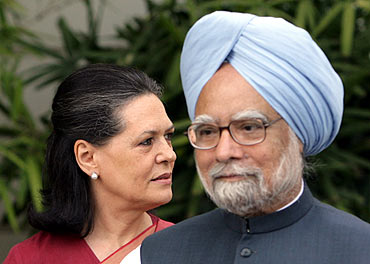
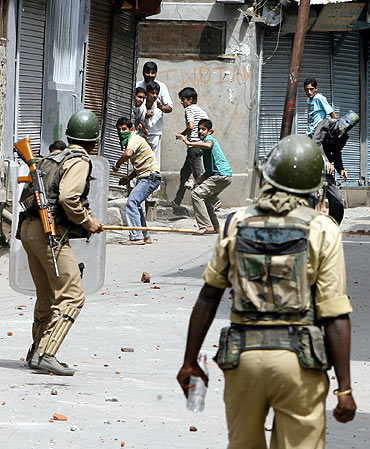
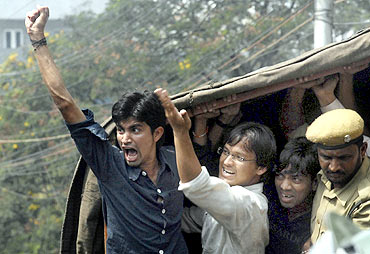
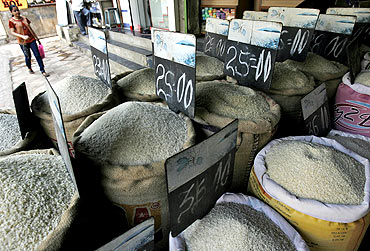
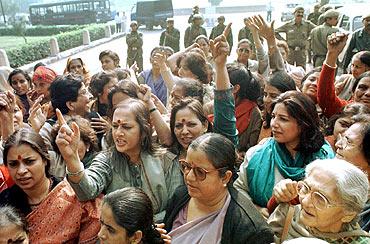
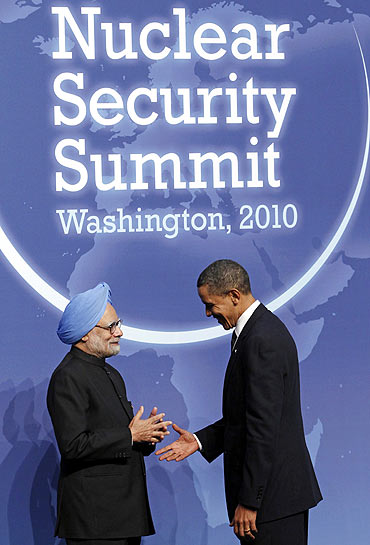
article